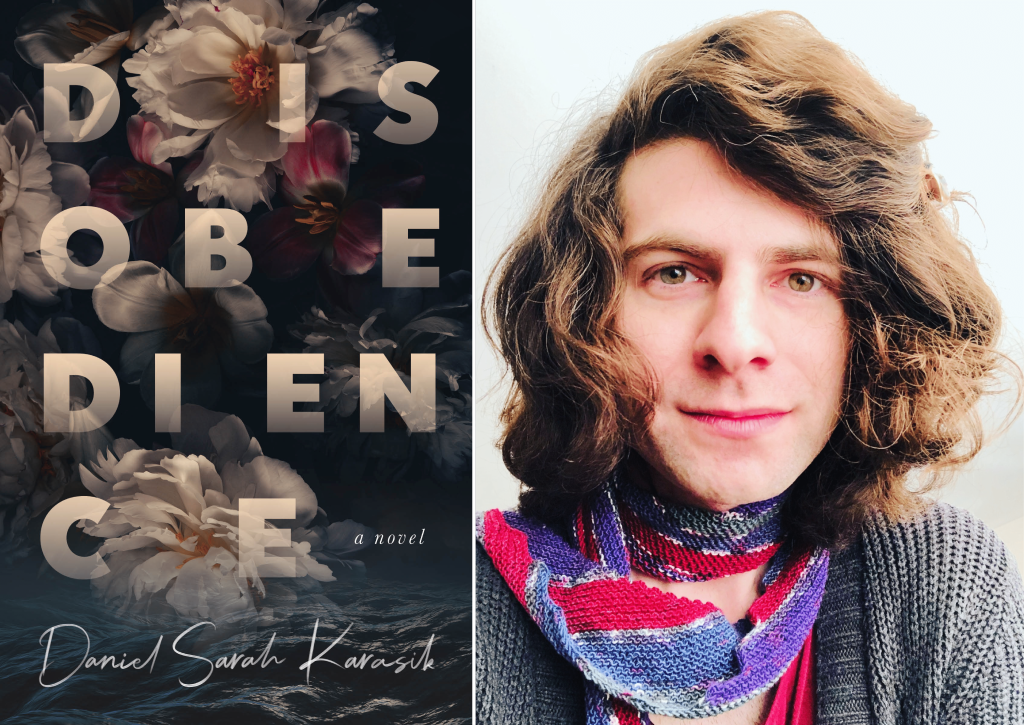Winter/Spring 2024 Fiction Preview: Disobedience by Daniel Sarah Karasik

The next title in our Winter/Spring 2024 Fiction Preview is Disobedience by Daniel Sarah Karasik!
Shael lives in a vast prison camp, a monstrosity developed after centuries of warfare and environmental catastrophe. As a young transfeminine person, they risk abject violence if their identity and love affair with Coe, an insurrectionary activist, are discovered. But desire and rebellion flare, and soon Shael escapes to Riverwish, a settlement attempting to forge a new way of living that counters the camp’s repression.
As the complexities of this place unfold before Shael, Disobedience asks: How can a community redress harm without reproducing unaccountable forms of violence? How do we heal? What might a compassionate, sustainable model of justice look like?
This is a remarkable work of queer and trans speculative fiction that imagines how alternative forms of connection and power can refuse the violent institutions that engulf us.
“Breathtaking in scope and thrillingly thoughtful, Disobedience lit up so many parts of my brain at once. In their dystopia that is a terrifyingly logical extension of our present moment, Daniel Sarah Karasik illuminates so much about our broken society, and the precious commodity of trust. A dire warning that is also dramatic, sexy, and bleakly hopeful, this story will stay with me for a very long time.” —Jessica Westhead, author of Avalanche
Daniel Sarah Karasik has shared a video to introduce Disobedience in anticipation of the book’s release:
We’ve also selected an excerpt from the novel to share with you today! Disobedience will be released on May 21, 2024, and is available for pre-order from our online shop or from your local independent bookstore.

Shael feels a relief of cool air on their face as they step into the house. Only then do they realize how overheated they were becoming under the intense sunlight. Their slippers tap against a white-and-black tile floor with a slight shine, disturbing a silence that seems perfect—but only for a moment. From across the house, not far from them and somehow also very far: music. A piano. Shael recognizes the sound from films. There’s music in the camp—on celebration days, in some work zones—but never live. No instruments. Never, like now, so nearby and at the same time so far away. They continue down the hall. The walls are bare, the corridor filled with the scent of fresh-cut flowers, though mild, not like the scents manufactured in the camp that mimic these. In its every detail, the house strikes Shael as clean.
The hallway opens into a wide, bright room. An assortment of soft chairs, occupied by robed people of many ages, sizes, shades. Through a bank of windows, sunshine and green. At the far end of the room: the piano. A tall person sits before it. The hood of their robe lowered, dark hair cascading in waves almost to the piano bench. Like the others in the room, Shael and Calla watch the pianist play. The music is sprightly, with an undercurrent of longing, perhaps a note of menace. At a pause, the pianist glances over their shoulder and meets Shael’s gaze.
Only then does Shael observe the room’s occupants more closely. Only then do they notice that many others in the room appear to be…like them. The elders are more immediately legible as such, Shael thinks; it’s subtler among the youth. This thought is followed at once by another that knocks the air from their chest: There are elders here. Elders like them. Openly so, and surviving. Not purged, not disappeared into hard correction centres, not forced to deny, deny, deny. And the elders here sit alongside the young, without division, listening together to the music. A wiry, muscular youth rests their head against the full chest of an elder, whose long white hair casts the youth’s face in shadow. Others sit together with more physical separation but still a palpable shared comfort. Maybe some are kin—though Shael also senses, in permutations difficult to parse, webs of desire curling through the room.
____________________________________________________________________________________________
Daniel Sarah Karasik (they/them) is the author of many books, including two poetry collections, Plenitude and Hungry, and the short story collection Faithful and Other Stories. Their work has been recognized with the Toronto Arts Foundation’s Emerging Artist Award, the CBC Short Story Prize, and the Canadian Jewish Playwriting Award. They organize with the network Artists for Climate & Migrant Justice and Indigenous Sovereignty (ACMJIS), among other groups, and are the founding managing editor of Midnight Sun, a magazine of socialist strategy, analysis, and culture. They live in Toronto.

